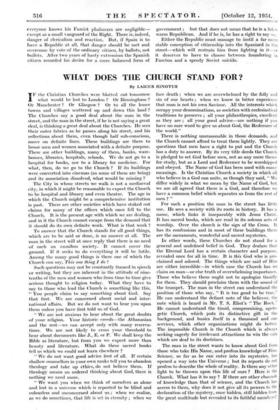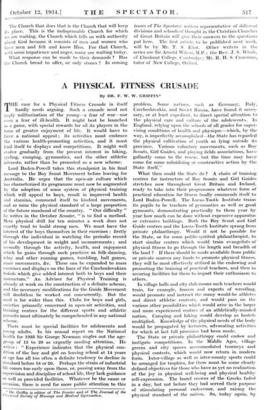WHAT DOES THE CHURCH STAND FOR?
By LAICUS IGNOTUS
IF the Christian Churches were blotted out tomorrow what would be lost to London ? Or Birmingham ? Or Manchester ? Or Glasgow ? Or to all the lesser towns and villages scattered up and down this land ? The Churches say a good deal about the man in the street, and the man in the street, if he is not saying a great deal, is thinking a great deal about the Churches. He sees their outer fabrics as he passes along his street, and his reflections about them, even though half sub-conscious, move on definite lines. These buildings are there to house men and women associated with a definite purpose. There are other buildings, many of them, banks, ware- houses, libraries, hospitals, schools. We do not go to a hospital for books, nor to a library for medicine. For what, then, do we go to the Church ? If its buildings were converted into cinemas (as some of them are being) and its association dissolved, what would be missing ?
The City in whose streets we walk is not a mediaeval city, in which it might be reasonable to expect the Church to be hospital and library and even theatre. The age in which the Church might be a comprehensive institution is past. There are other societies which have staked out claims for many of the offices which once fell to the Church. It is the present age with which we are dealing, and in it the Church cannot escape from the demand that it should do its own definite work. What is that work ?
To answer that the Church stands for all good things, which are to be said or done, is no answer at all. The man in the street will at once reply that there is no need of such an omnibus society. It cannot cover the ground. If it seeks to do everything it will be futile. Among the many good things is there one of which the Church can say, This one thing I do ?
- Such questions may not be constantly framed in speech or writing, but they are inherent in the attitude of nine- tenths of the men and women who from time to time give serious thought to religion today. What they have to say to those who lead the Church is something like this.
"You people claim to say something about God. Say that first. We are concerned about social and inter- national affairs. But we do not want to hear you upon them unless you have first told us of God.
"We are not anxious to hear about the great doubts of your religion. Your historic creeds—the Athanasian and the rest—we can accept only with many reserva- tions. We are not likely to cross your threshold to hear about documents like J., E. or P. We shall keep the Bible as literature, but from you we expect more than beauty and literature. What do these sacred books tell us which we could not learn elsewhere ?
"We do not want good advice first of all. If certain shallow counsellors in your own ranks tell you to abandon theology and take up ethics, do not believe them. If theology means an ordered thinking about God, there is nothing we need more.
"We want you when we think of ourselves as alone and lost in a universe which is reported to be blind and colourless and unconcerned about us ; when we realize, as we do sometimes, that life is set in eternity ; when we face death ; when we are overwhehned by the folly and sin of our hearts ; when we know in bitter experience that man is not his own Saviour. All the interests which occupy your denominations, as societies with ecclesiastical traditions to preserve ; all your philanthropies, excellent as they are ; all your good advice—are- nothing if you have no sure word to give us about God, the Redeemer of the world."
There is nothing unreasonable in those demands, and the Church cannot afford to treat them lightly. They are questions that men have a right to put and the Church has a duty to answer. By its very title deeds the Church is pledged to set God before men, not as any mere theme for study, but as a Lord and Redeemer to be worshipped and obeyed. The Name of God has been used with many meanings. Is the Christian Church a society in which all who believe in a God can unite, as though they said, "We differ widely in what we mean by the Name of God, but we are all agreed that there is a God, and therefore we have a common belief which separates us from the rest of men ? " . "
For such a position the man in the street has little use. He sees a society with its roots in history. It has a name, which links it inseparably with Jesus Christ. It has sacred books, which are read in its solemn acts of worship. Over the church is the sign of the Cross. It has its confessions and in most of these buildings there are the sacraments, .wonderful and sacred mysteries.
In other words, these Churches do not stand for a general and undefined belief in God. They dealare that the Eternal Lord has a certain character and purpose, revealed once for all in time. It .is this God who is pro- claimed and adored. The things which are said of Him are either incredible—in which case the church has no claim on man—or else truth of overwhelming importance. Those who believe them ought not to apologize timidly for them. They should proclaim them with the sound of the trumpet. The man in the street can understand the position of those who say,." It is too giood to be true." He can understand the defiant. note of the believer, the note which is heard in Mr. T.. S. Eliot's "The Rock." He cannot understand the timid, compromising, apolo- getic Church, which puts its distinctive gift in the background, and busies itself in a thousand and one services, which other organizations might do better. The impossible Church is the Church which is always seeking eagerly for irrelevant attractions to win the ears which are deaf to its doctrines.
The man in the street wants to know about God from - those who take. His Name, and profess knowledge of Him. Science, so far as he can enter into its mysteries, has opened -a way into the Universe;. but its -reports do not profess to describe the whole of reality. Is there any other light to be thrown, upon this life of ours ? Here is the Church. What has it to say ? If there are other channels of knowledge than that of science, and the Church has access to them, why does it not give all its powers to the declaration of the mystery, once hidden, still hidden from the great multitude but revealed to its faithful members? The Church that does that is the Church that will keep its place. This is the indispensable Church for which we are waiting, the Church which tells us with authority about God because it consists of men and women who have seen and felt and know Him. For that Church, with some impatience and anger, many are waiting today.
What re. sponse can be made to their demands ? Has the Church bread to offer, or only stones ? In coming issues of The Spectator writers representative of different divisions and schools of thought in the Christian Churches of Great Britain will give their answers to the questions put here. The first article, to be published next week, will be by Mr. T. S. Eliot. Other writers in the series are Sir Arnold Wilspn, ?LP.; the Rev. J. S. Whale, of Cheshunt College, Cambridge ; Mr. R. II. S. Crossrnan, tutor of New College, Oxford.















































 Previous page
Previous page